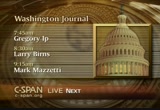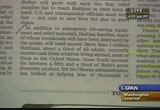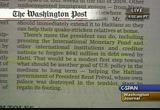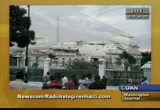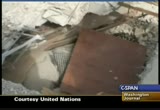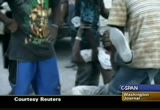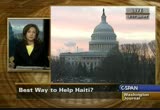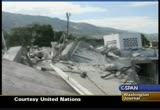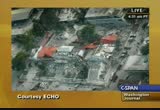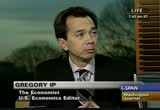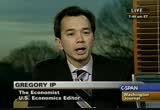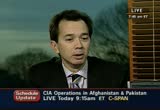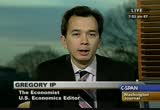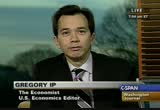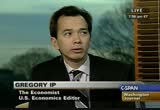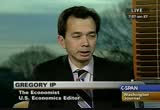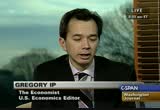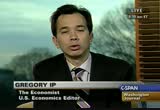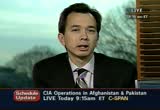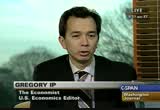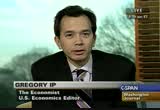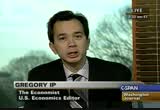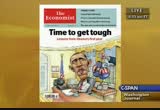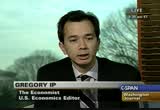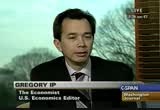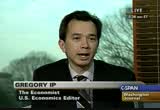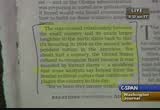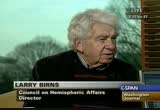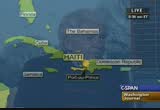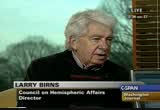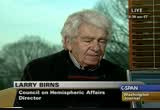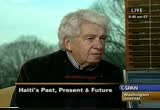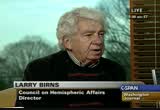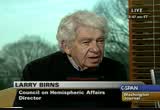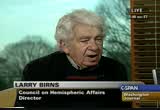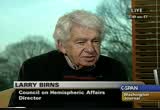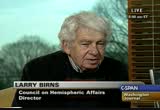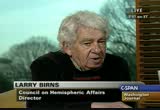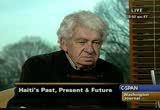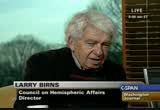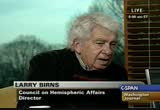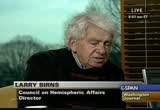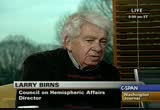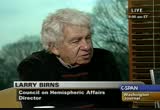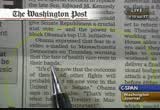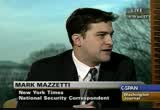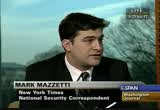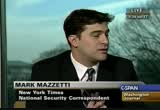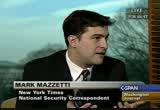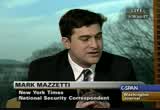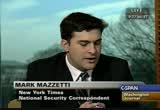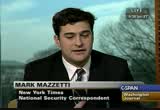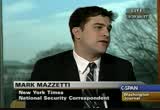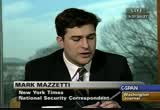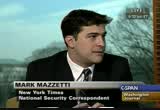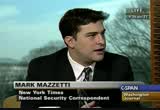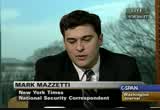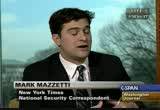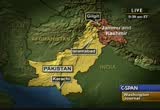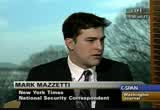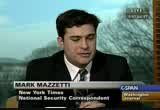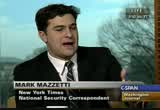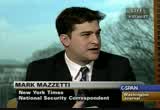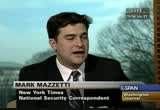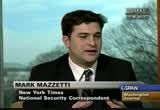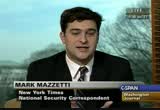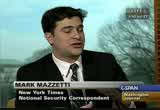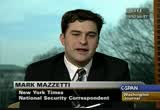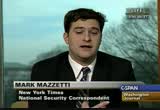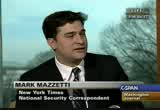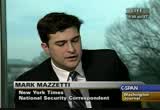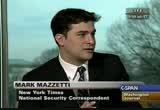tv Washington Journal CSPAN January 15, 2010 7:00am-10:00am EST
7:00 am
7:01 am
here is the front page of "the new york times" with pictures and had nine similar to other papers. this morning, within a "the washington post," the editorial -- averting chaos in haiti. the paper writes of this -- yet the obama administration has balked helping haitians currently here illegally granting them temporary legal status, this despite u.s. of --
7:02 am
law that specifically allows the government to extend temporary protected status to undocumented immigrants in natural disasters all wars and a home countries make it impossible to deport them. the editorial goes on to say this -- that is "the washington post" this morning. "the new york times" editorial at those the washington post. calling for allowing haitians in the united states who are here illegally to find work. "the new york times" echoing "the washington post." the first phone call comes from
7:03 am
chris on independent mine in ohio. good morning. caller: the morning. everybody keeps getting -- host: go ahead, we can hear you. caller: pat robertson was right. it did -- they did sell their souls to the devil. not that we should not help -- we should help. they went with the french -- now they're asking americans to save us. host: what part of history are you saying? caller: pat roberts and back -- said back in 1761, i think, that they chose to sell their souls to the devils -- the french, communist, but they are begging us to help. we cannot even support ourselves. we are getting ripped off by our own government. how can we support them, too? i don't understand -- we are starving to death and, yes, i understand it was a natural
7:04 am
disaster but it was not our fault and that understand we should help, there is no problem with that, but why is it we are starving to death, too. host: what about the editorials in the papers this morning that are asking the u.s. government to allow haitians in this country to help haiti themselves by allowing them to get jobs? caller: we can't even find jobs. we don't have jobs. our government is selling our souls out to everybody else. we don't have jobs. we need jobs. we need to get rid of all the regulation, we need to get rid of everything than the american people could go over there and rebuilt in two seconds. host: lloyd on the republican line. indiana -- pacatello, indiana, that i pronounced that correctly? caller: yes? host: i think we lost lloyd.
7:05 am
snow hill, north carolina, joe we on the democratic line. caller: i think out of this, a very tragic situation, but haiti has been such a poor country for so long and we have neglected to help right in our own backyard and it would not take too much resources. but we have neglected. it is sad that it takes a situation like this for people's eyes to be open. but if i see anything that came out of this that would help the people is that at least it is being seen now. in the past, i remember the last administration, when those guys were getting be headed over in haiti and everything and they were not even letting them to move a year, they would turn them back, and other people back, so i think this is a thing where americans could really show our good side and i think obama is doing it and i think this is part of us restoring our image if we go in and do it right and if he does not do like
7:06 am
the past of the stations and a lot of administrations before by neglecting this country -- i really feel for the haitian people. as i said, i think they have been through a lot. and i think this should bring the haitian -- i think it is bringing it to the forefront. and i think in the future -- in the future it might work out, like i said, a sad situation but it might work out for the better. what we should do is go and do what we are doing right now because they are in our own backyards and it is in our interest to help these countries right around us regardless of whether they are black or whatever. host: on the website of the u.s. trade representative, it says ustr, haiti certification of what that recalling hope ii benefits, 2008 legislation,
7:07 am
long, that allows the haitian people to export duty free access to u.s. markets for certain haitian-made apparel and other articles. it says it was an extension made for that legislation. little rock, arkansas, paul on the republican line. good morning. caller: good morning, greta. i totally disagree with the last caller. i don't think that united states should totally put this -- foot this bill. i think the united -- international community should put it. we have millions of haitians here who are here. they are already spending -- sponging off our resources, so i think that we have done enough
7:08 am
good to haiti and i feel that' e are not responsible for footing this entire bill. host: you mentioned the international effort. at the top with a list of what other countries, it initially leave that is offered to the country of haiti. germany, 2 million, finland, 1.8 million, italy, 1.5 million. that is the initial aid relief going into the country. also, this is "the wall street journal" that we showed you and it has a graphic of the u.s.- military led relief as it is arriving. today they are expected to get another large aircraft carrier into the country. 14 helicopters and relief supplies, that is "the wall street journal" this morning. urbana, illinois, dave on the independent line. good morning. caller: i have been watching
7:09 am
pretty closely the news event and some of the facts that i have heard is about 60% of haitians were unemployed before that, and about one out of town were receiving some sort of foreign aid. so i would like to see the united nations take the lead role. this will obviously take a long time to heal this country. i and just concern for u.s. orders at this point, including puerto rico. host: we found on the state department website yesterday that the unemployment rate in the formal sector is between 70% to 80% and 54% of patients live on less than $1 a day and a literacy is estimated at 44%. in "usa today" there is an article that says haiti's per capita income of $790 compared
7:10 am
to $10,600 -- $10,200 for mexico. that is according to the international monetary fund and written up in "usa today." dallas, texas, james on the line for democrats. caller: thank you for taking my call. i'm all for allowing the haitian immigrants to come over here to the united states for temporary work visas. first, granting it would be one thing and in getting a job would be something else. but i am all for it. but i think our country should be very proud to see that we are reaching out, it is very refreshing seeing rapid response and is coordinated effort. seeing the presidents bush and clinton getting together, so
7:11 am
people can go out and to the community and it's a money to help them. so, i'm very proud to see this and we should be very, very proud of our country reaching out and showing support in doing what we can. it is a good moment here to see. host: washington, d.c. stanley on the republican line. caller: i think the u.s. would help haiti -- if they can extend the legislation. maybe a reconstruction fund by allowing the 2 million haitians living in the united states to provide $10,000 a year for five years to go to some kind of construction funds. i am a jiabao pot -- pat robertson, i am a conservative but i think he should apologize and we believe in god like him
7:12 am
of the words he said last night were offensive. just like in the united states with respect the religious rights of every community, i think the haitians, we are catholic, we are christians, and there are people who believe in voodoo, they are right, but -- host: are you haitian? caller: i am patient. host: when did you come to the country? caller: i was a kid. we love the united states and we fought alongside americans in savannah, georgia, to help it, we shed blood for this country. we are aligned with the united states. pat robertson what he said last night was really offensive. host: do you send money back to relatives? caller: we do, we send $2
7:13 am
billion every year. it is decreasing because of the economic recession in the united states. a lot of the haitians now, the level of unemployment, and in the united states, 24%. we pay our taxes. we are good citizens and we do our best to contribute as well. and you can see by looking at the panel on cnn and all of those people like wyclef jean, and a 76, the guy playing basketball, political director in the white house -- we are here to intervene to society as well.
7:14 am
host: you personally, how much money do you send back? you gave the figure $2 billion -- is that nationwide how much patients bring -- or send back to haiti? caller: what we send back to haiti it is about 0.7% of our earnings. an average of 100, $200 on a monthly basis. by myself i collect money from people for political education and civil society groups and micro credit projects and four times a week high provide training via skype, so, all of us are doing our best to help the country and by allowing the diaspora to give $10,000 for five years, we can build together a fund. and people like bill gates would
7:15 am
give $30 billion from the gates foundation -- you can contribute to that fund. mr. turner from cnn, i think he gives a couple billion dollars for humanitarian activities. if people like that and corporations and leaders put together the haiti global fund. i am very thankful for the government's -- the government, president obama and religious organizations. host: we will leave it there, stanley, ended more money figures. this is before the earthquake. crandall, florida, teresa, independent line. a caller: geographically haiti
7:16 am
is right on our doorstep and the issue is to get the supplies as quickly as possible. it has been three days. i in the stand airport in port- au-prince is congested and the ports cannot be used because of destroyed infrastructure. i was watching -- i just saw a clip that there is an aircraft carrier coming now with helicopters. host: according to "the wall street journal" thisç morning there is another aircraft carrier on its way along with helicopters. caller: it has been three days. if this were a war maneuver, believe me, the aircraft carrier would have been there and the needed supplies would have been lowered down to the people. i just have one more comment. a caller from arkansas who said it is not our responsibility to foot the bill, well, if he is a christian, what about being your brother's keeper or is it more convenient to cherry pick bible passages. host: leesburg, virginia, brian on the line for democrats.
7:17 am
caller: i think we shall almost write off the pat robertson, because i think we can all agree the situation we need to help the people out anyway. the country was in pretty bad shape as it was. but i think it is really important, i was watching a report on how a bunch of prisoners escaped and there is massive gains and i think -- çgangs, and that has a possibility to risk all the relief we are sending and the effect is reduced drastically. i am not suggesting necessarily martial law but i think we need to secure some major areas, not only poor, but supplies to make sure the humanitarian aid effort is on the ground is secured first. i think that is just as important as sending money. host: the man in charge of the u.s. agency of international development speaks at the state department news conference. he has been in the post for five days when haiti was hit by the
7:18 am
earthquake. croft and, maryland, joe will on the republican line. caller: i think it is a tragedy what happened in haiti and i'm just curious, if i was in a foreign land or another state and my home was destroyed, touching on the haitian immigrants, if i got news my home was destroyed the first thing i would do is go home. i think the most valuable resources right now in haiti is manpower to help save lives and to help rebuild and i think it is kind of shameful that the haitians are not going home. and one more point, what are -- host: you heard that the airport is closed and haitian government is not allowing any more airplanes to come in because they don't have enough fuel to get their planes out of there and also the port is damaged and so they are having a hard time getting ships as well into their, so how would you
7:19 am
expectations of able to go home at this point? caller: i am pretty sure most of them came here by ship and i'm sure you can still get to haiti by sea. but i'm just curious, what are the natural resources, if anybody knows, when natural resources does haiti have can what is going on politically that is keeping the people there in such poverty? and the last thing is, and the american people, everybody in our government needs to go. host: for you and others, we will talk about the past, present, and future of haiti at 8:30 a.m. eastern time with larry birns and we will talk about the situation there. obama pledges $100 million in relief is the headline in "usa today."
7:20 am
7:21 am
takes this catastrophe -- hello? host: we are listening. caller: nobody has paid attention over the last 100 years how this country, the corporations have torn the country apart, decimated the sugar industry, the rice industry and the 1998 clinton sends seals over to kidnap the president and sends him to africa. we should have turned this place around a long time ago. the worst part, the international republican association thought it would be a great place for a lot of sweat shops. of the last republican speaker, we hear the ignorance. host: asheville, north carolina, brian on the independent mind. caller: i think it would be a perfect opportunity to help out the haitians and their own people. i am sure there are a lot of construction companies in this country, a telecommunications
7:22 am
companies, that would be willing to go over there and supply the people to help rebuild this country and also trained the haitian people to carry on one to the effort gets started. i think we should take part of that money that has been donated and give our own companies incentives and our own people to go over there and do this and put our people back to work and that the same time rebuilding our nation -- that nation. host: are you a businessman? caller: small business for 30 years. host: is it something you would do yourself? caller: yes, i would go over there and live four or five years and get paid what teaching the people how to rebuild and help them to rebuild. host: ok. a little bit about the telecommunications situation in haiti. the quake severely strains telecom services.
7:23 am
host: now we want to turn our attention to in the next few minutes, the other story here in washington that is in the newspapers this morning, it is on the health care politics. joining us on the phone this morning is alex wayne of congressional quarterly. alex, i want to start with the headline. obama promises to help democrats sell a final health care bill. what did he say yesterday? guest: he told them that he wants to get the bill done, for starters. that he appreciates all of their work. and after they pass this final bill in the next few weeks, he is going to go across the country, coast to coast, trying to sell it to the american
7:24 am
people. host: there is also a headline that there was a deal struck yesterday between the white house and labor unions. what are the details? calguest: they agreed to modify an excise tax that is a big piece of the financing. it would fall on health insurance plans that have high premiums starting at about $85,000 for individuals or $23,000 for families. they raised the threshold to about 24,004 families. but in a bigger compromise with unions they agreed to exempt collectively bargained health plans from this tax entirely until 2018. host: there is also a lot of discussion between the white house and house democrats and senate democrats about exchanges in the legislation. the two bills differ. what are they talking about doing? guest: the house bill would have
7:25 am
a single, new, national what they call health insurance exchange where people who don't have insurance can go to purchase policies that would be regulated by the government. they would not be able to discriminate against creek existing conditions. the senate bill is different, it sets of state based exchanges so you could have as many as 50 or even more possible exchanges across the country. a lot of house democrats and senate -- senate democrats, too, preferred a single national exchange, that it could be administratively easier and people would have more uniform benefits across the country. so, we believe the president is also for a national exchange but i do not think that issue has been settled yet. host: house democrats are in washington talking about issues for the next congress, starting this week, but legislative work gets underway next week.
7:26 am
primarily talking about health care. they are supposed to hear from former president bill clinton today. what do you expect him to tell them? guest: i am not sure -- i am sure he will say, don't make the same mistake i did and let this fail when democrats failed to pass health care in 19903. the 1994 elections rolled around and they were punished. not just for that, but a lot of people were saying they were punished in 1994 partly because they were not able to pass health care. you might see political repercussions. host: finally, when can we expect the house democrats and the democrats in the white house to come up with a deal, and is that even possible? guest: definitely possible. personally i do think there will be a deal because it is very rare each chamber of the
7:27 am
congress passes a bill and then fails to reconcile the differences -- even though this is not really a conference board -- to get a final bill together. house democrats told us yesterday that they would like to have a deal by today. they have blown some any deadlines that i did not put a lot of stock in that. but i would not be surprised if they get something done at early next week. they were telling us yesterday, some agents were telling us that the election in massachusetts was an issue here -- they would like to have a deal in hand or be on the way to 1 by tuesday so they can't help it in massachusetts and about the candidate. host: the front page of "the boston globe" this morning says brown's run may be a model for gop. the health care bill is serving as sort of an albatross for the democrat up there. guest: the election of there, i
7:28 am
think, is a referendum on the health bill. i think popular wisdom is that the democrat will pull it out because it is massachusetts. but, of course, if she doesn't it changes the whole equation. host: alex wayne, thank you for your time and update on the health-care negotiations happening in washington. back to our discussion about the best way to help haiti. fountain hills, arizona, the and on the republican line. thank you for holding. caller: i heard some comments today, people who seem to have them access to grind against the poorest of the poor in haiti. i'm a republican, easy for me to say to keep the money in america but your heart has to go out to these people. but we have been trying to solve the problems of the there for about 150 years.
7:29 am
after all, the dominican republic flourishes and haiti has just been terrible. but at this time, that discussion has to be set aside and money and our hearts go out to these people. host: have you contributed? how'd it go about doing it? caller: american red cross. online, write to the red cross. host: the mind telling us how much and was it easy to do? do you trust the red cross? caller: the red cross may not be the best resource over there, but it is the one i'm familiar with and i know when i send my money to the red cross it gets to the right place. host: there is a headline related to private donations. it says --
7:30 am
oneç newspaper notes the red cross has been able to raise about $5 million in $10 donations by texting to them. a also more on donations this morning in the newspapers -- companies efficiently pour out $60 million to help haiti. that is also "usa today" in the money section. six corporate donors pledged 1 million more in cash or cash in kind support, and it includes these companies, as we look at those. we go to the next phone call. sonny on the democratic line in alabama. good morning. caller: i really wanted to agree with a couple of callers who activists said -- who actually
7:31 am
set a good idea for american contractors to go down there. certainly in a disaster like this we should be assisting in any way we possibly can. it is a tragic situation. but that said, i'm not sure how long that military occupation will last down there, what are standing would be after we leave. logistically right now they are having problems getting airplanes into the airport. you said earlier the haitian government had stuff block the airport -- actually the haitian government seems to be almost absent. and we have several different military bureaucracies and ngo's working trying to call more need. çq. but this morning said this morning we cannot fly over their airspace -- cuba this morning. we need to be staging and getting them in and out without having been flying around so we have a disaster on the air.
7:32 am
my final thought on this is, i told the support helping the people in haiti. it is a terrible situation. but it appears to me we are actually moving faster there and katrina. and we have an ongoing disaster in ourw3 country, 44,000 out -- 44,000 people dying without health care and several million american families already lost their homes due to the wall street earthquake and that is going to get worse and i don't see us as a nation moving as quickly to help ourç own, and when they say charity begins at home, i would like to see something like that happen. the idea of families losing their homes because of economic condition that they really did not have as much a part in is justç abominable and we need to do somethingç as a nation. host: hot springs, village. -- hot springs village,
7:33 am
arkansas. henry on the independent line. caller:ttç please don't cut me . i agree with the last person 100%. the thing is, i believe that the haitian people should be relocated but not in the united states. çwe are in a dire problem here, like the man said before me. they are suggesting for the people coming here temporarily. nothing is temporary. everything, it is written in stone. we are one of the richest countries in the world. if they say we are $100 trillion in the whole, the richest country in the world, then we are, but we are not. but to think about the haitian people, they should be relocated. not rebuilt. because if they rebuild it will take years -- not months, it
7:34 am
will take years. host: minneapolis, joseph on the line for democrats. caller: i think it was charles barkley saying if you can give the dollar, that's all you can do, and if getting a dollar helps, give a dollar. ignorance and silence, it just serves the purpose of the perpetrators against humanity. we have to educate ourselves about what is going on. it amazes me because, ok, now america can start to digest a cornell west -- these are common brothers. we come with some truth and there is so much resistance, taboo. yet somebody like pat robertson, this guy can perpetuate -- i mean, how does he get away with doing that? but i guess there is one good thing -- he exposes all the marks.
7:35 am
there is no words for a guy like that to get on the air and perpetuate -- just his hot headed this proves he is a child. host: been on the republican line from asheville, north carolina -- dean. caller: i really feel bad for the people of haiti. obviously, they were not prepared for earthquakes with all the buildings collapsing like they are. i don't have the money to send it to haiti. i lot -- a lot of people don't have the money to send to haiti because our country is in such bad shape on its own. i am going monday myself to give blood at the red cross, trying to help physically. but i think if anybody is texting to the cell phone company certain numbers, and $10
7:36 am
automatically been added to the cell phone bill, if anybody believes that money and the money that our government says it is actually going to go to help the majority of people, i kind of doubt that because i think the ones that are really going to end up making a killing off of this are the slumlords, gang leaders, which, by the way, is probably all the government leaders. host: we touched on politics a little bit of alex wayne. the headline in "the wall street journal." there is a new poll this morning, likely voters in the bay state have turned it expectations upside-down as republican state senator scott brown now leads democrat attorney general martha coakley. it is according to the suffolk university -- news poll and it
7:37 am
found independent candidate joseph kennedy, no relation to the legendary clan, had 3%, and 1% undecided. ohio, scott on independent line. best way to help haiti. caller: first off, i would like to say i called a few months ago. i'm an unemployed nurse. since our government seems to be the to spend so much money on some of different programs, i'm wondering if there is anybody listening in washington, there would be any way that they could round up, say, unemployed and retired health-care professionals to be able to put them together and send them when there are tragedies like what is going on in haiti. because i know the doctors and nurses that are there are pretty overwhelmed, and they could
7:38 am
probably use the help. and i guess i want to close by saying that i really would like to thank pat robertson and rush limbaugh for making those of us who feel like we are conservatives look like incentives jerks. host:, the republican line. caller: good morning. i have been to haiti. it has been years ago. it was above -- one of the worst and impoverished countries i have been to in my life. they speak of third world countries, then haiti would be classified as a sixth world country. but they were always owned by the french -- french owned and speak french and all, but i have not heard yet, what is france sending? how much has france pledged to help them? and also haiti is 85% catholic
7:39 am
and i have not heard the pope is saying anything yet. how much is the vatican, how many millions of dollars is the vatican sending to help the poor people? i would like to see the catholic church help -- like a set, 85% catholics of the catholic church needs to help, too, to buy their much. host: ohio, ann online for the democrats. caller: we have the short-term problem in the long term problem. what i can't figure out -- general electric and westinghouse, they built all of these factories over in china and we have not helped the people in our own hemisphere, you know? president clinton talks about that. you know, it is a long, slow process. i think we need to take care of
7:40 am
our own hemisphere here. in short term i think they should probably send some helicopters in and drop food from the air like they have done before. that is all i've got to say. host: we are going to continue with this conversation later on this morning. we will talk with the emergencì+ response director for care, and he is in haiti and we will speak to him on the phone around 8:30 a.m. eastern time and then larry birns, director of the council of hemispheric affairs will talk about the past, present, and future of haiti. before we get to that we will talk to greg ip next. the latest edition. it time to get tough. we will talk about washington and wall street but first a news update from c-span radio.
7:41 am
>> this weekend, a tufts university history professor peniel joseph on the 1965 voting rights act and how it paved the way for future african american leadership. he will discuss his book with kevin merida, washington post editor. next week, your chance to talk to the office of the best- selling "game change." they take your questions on the
7:42 am
2008 presidential campaign and the impact of the book on washington politics and policy. live, tuesday morning on c- span's " washington journal." >> middle and high school students, just a few days left to enter is c-span's students cam contest, send your video on one of our country's greatest strengths or challenge the country is facing. get it to c-span for a chance to win a grand prize of $5,000, with $50,000 in total prize money and all winning videos will be shown on c-span. don't delay. make sure to up late -- up load your project by midnight wednesday. >> "washington journal" continues. host: greg ip is u.s. economics editor @ "the economist." flipping through the latest edition of "the economist." you wrote a piece about tarp and the bailout program for these banks.
7:43 am
but there is also a story here -- embarrassment of riches. the profits and bonuses we expected to hear about from these companies as early today. j.p. morgan will come out with their numbers today. then a headline in the business section of "the new york times" 11 on big finance firms to raise more than $100 billion. what is the strategy? guest: essentially that the situation that they think of the $700 billion that was originally often buys to help out the financial system, the so-called tarpi] program, they will end up getting it all back except for $120 billion or perhaps even less, and it would like to wait to recoup the money from the companies benefited the most of the program. the other purpose for this tax is political. there is a lot angrier at the banks. this notion that the crisis was their doing. you can argue whether or not that is a fair statement, but in any case that is the belief, that this crisis is they're
7:44 am
doing and, lo, they are racking up record profits in 2009 and should be some recompense for the taxpayers of this serves the purpose. not going as far as the british have, let's bring a punitive 50% tax on the bonuses. -- levying a punitive 50% tax. host: does this solve theçó isse of too big to fail? guest: the tax will delivered -- levied not necessarily on the compensation but how much debt the banks have, it will come to punish the biggest banks because it is only charged for the big banks but it -- but the implicit guarantee cents a began that the government will law -- not let them fail. when you see big interest rates these banks pay when they go out it is exceptionally low when you look at how risky the situation is. a fee that amounts to 0.15% of their debt will not overcome that.
7:45 am
we are not structured in such a way that it creates an incentive to shrink. if you are a big bang today, you are going to pay it even if you are not five years from now host: let us go to the headline of "the economist." what are you expecting to hear on the numbers of profits and bonuses? guest: there are a lot of estimates. "the wall street journal" estimate $140 billion in 2009 -- not only more than 2008 but 2007, the height of the boom, an astonishing performance. it is not money made by old- fashioned banking, taking a deposit and making loans to home buyers and small businesses. it is basically money made by their capital markets business, underwriting stocks and bonds in trading. host: let's go back to the beginning of tarp, originally the $700 billion program.
7:46 am
thai what you just said back into your story, cheap as chips. guest: a nice little british expression, which means this tarp, if you look at crises that happened throughout history and other countries, arguably, the treasury believes would be one of the cheapest bailout in history. let's say it does cost from $120 billion, that is less than 1% of gdp. the average bailout in modern history has been 13% of gdp. you have to ask the question, how is it we are so lucky? is it that the treasury and the federal reserve were just a lot smarter and faster about the way the rescue the system this time around or are they too optimistic? my view is it is a little bit of both. my view is the tarp plan would move very quickly to recapitalize weakened banks and lend a lot of money to overcome the panic, but i also think it
7:47 am
is way too soon to be so optimistic that this is over. four years after japan's crisis began bit of the bailout would be 3% of gdp and we now know it was at least 14%. host: some news on the associated press wire about j.p. morgan chase. the banking giant said friday it earned $3.28 billion in the final three months of 2009 primarily because its investment banking and trading businesses were still profiting from the 10-month market rally. what you make of that number? guest: that is a lot of money. when you think about it -- the tax would cost a billion dollars a year -- host: what president obama is suggesting. guest: and the money, again, was made not of banking but by trading, and so forth. it is important to remember those numbers and not if you look at what happened in the stock market and bond
7:48 am
markets in 2009, it was one of the most spectacular rallies and history partly because we were coming back from such a dark depths. it is not conceivable that the year 2010 will be anything like that. i would really doubt they would make profits like that or handout bonuses like that. but still, you can't get past the fact that when the banks were doing so well against the backdrop of 10% unemployment, 10% if you include hidden unemployed, and it seems an incongruous. host: " the new york times" as an example of how much the proposed tax would cost each company. citigroup, 2.1 million is the estimated annual fee -- i am sorry, you are right, $2.1 billion. we will take a look at that as we continue to talk here. the banks are saying this could be passed on to the consumer. if you tax us it will get passed on to the consumer.
7:49 am
how would that show up? where would they see prices go up? guest: when the white house briefed journalists about this, they were asked that. their answer was, only some banks will be paying the fees. the smaller and medium-sized banks would largely be scared. their point is it the large banks try to pass it on it will create a competitive disadvantage and their loans would be more expensive and they will lose business so that would prompt and to eat buffet. i don't fully believe that. i think that is partly true but we know from basic economic theory, that if you settle a company for the new fee they have to kind of recall but somehow and it will probably be a little bit of charging more for customers and taking a little out of what shareholders and employees get. i don't think it is necessarily a bad thing. when you think of what the fee is trying to do, it is a message that these banks, their size and risk-taking poses an ongoing threat to the stability of economy which time to time
7:50 am
requires interventions that are expensive. their lending and trading should reflect that. in some sense, customers who are borrowing are benefiting from the implicit subsidy that all taxpayers are giving them because they will, whether you like it not, be on the hook when the bank is in trouble. it is not a bad thing to have the subsidy recaptured somehow. host: from "the new york post," it the mayor of new york, michael bloomberg, says the obama bank tax would wreck new york. he is quoted as saying this -- take a look at detroit. guest: detroit had a lot more problems than just taxes on cars. if you look at the banking system the last year two, this fee is the last of their problems. lehman brothers collapsed and wiped out tens of thousands of jobs. i return to my prior point, if
7:51 am
the only way this industry can survive -- of subsidy that ends up costing a bundle to the taxpayer, it is questionable whether that is actually an industry you want thriving. host: what about this headline in "the financial times?" let me just flip the page. it says executives if foreign banks reacted at anchor -- guest: that as one of the problems with the fee is structured, and posing the $50 billion cut off creates the incentives to get below $50 billion to escape it. notwithstanding, i think the purpose of the fee is quite legitimate. the way it has been structured is problematic for those reasons and because she, it doesn't in a very graceful way discourage these banks from
7:52 am
getting too large. the obama administration in the various proposals to reform the financial system suggested that the bigger of a bank debt, the more capital cushion they must hold against losses and that is meant to reflect the fact that both big banks are riskier and, in some sense, impose a penalty on bigger banks because it is expensive to hold capital. that is money you cannot lend out. i think that is a very smart approach. host: we are talking to greg ip from "the economist." queens, new york, roger on the republican 9. -- line. caller: hyperinflation. i'm curious, can you shed light on the possibility of hyperinflation for the united states and could you reflect on the past hyperinflation -- germany in the 1920's, can you
7:53 am
tell me how they got out of it? guest: i think the odds of hyperinflation in the united states is pretty close to zero. hyperinflation in the past has come about for a variety of reasons. most importantly is the government running extremely large deficits that they are either unwilling to or unable to finance from borrowing -- by borrowing from private investments. the central bank prints the money. the most famous was in weimar germany when hyperinflation was trillions of a percent and the most recent case is zimbabwe as well -- yes, the federal reserve has printed some money in order to sustain the economy but the amount they printed is extremely small relative to the size of the economy. in my view, there is still more of a threat of inflation going down than up. in the case of the past hyperinflation, the way solved it is they took the old currency and replaced it with the new currency that they refuse to inflate away by printing and it seemed to work. host: the democratic line, good
7:54 am
morning. caller: i have great respect for your work. part of the problem --w3 part it is really banking and part of it is really a casino. why can't we tax the casino part? guest: that is an excellent question. what i understand you are saying is, as we were taught in a mock earlier, banks do two things -- old-fashioned banking deposits and loans and in trading and investment-banking revenue. john maynard keynes referred to as -- this as casino-like. but i don't want to throw the baby out with the bath water. it is useful for the economy. we have a lot of companies that cannot get money from the banks but the markets. my pension money goes to the bonds issued by the countries. imagine my savings to the companies needed. it does serve a useful purpose.
7:55 am
but the utility, or the social good performed by that has receded in importance and a lot of these banks now make more of their money not just by the fees and underwriting the securities but trading them back and forth on their own books and in some senses they are starting to look like gigantic hedge funds. i think in the future you will see a lot less, both because it is a lot more expensive and also governments are trying to discourage it. host: tying it back to this headline, it says that the idea of the proposed tax is a product of six months of policy deliberations by the treasury secretary geithner and his team, which evaluated four competing options. these were, a financial transaction tax -- what you just said it occurs at banks now -- limits of tax deductibility of bank interest payments, surcharge on bank profits and a fee based on liabilities. talk about those.
7:56 am
guest: i talked about some of the more obvious things people are looking at. the transactions tax, which essentially meant to become a bank traded a stock, bond, or currency they would pay a tiny portion to the government. the idea was not just to raise rent -- revenue but discourage the casino-type trading. it was proposed by an economist named james tobin who won the nobel prize, but the reason why treasury ultimately rejected that, they concluded if only one country like the ninth insisted that all the activity would migrate to another country. -- if only one country like the united states did that, all the activity would migrate to another country. the one of the banking in a vindictive manner -- even if it is politically satisfying in the shorter term in the longer term it does not help the economy.
7:57 am
i think what they have done it struck in some sense a compromise which exactly not bad. yes, it will in some sense discourage banks from doing business in the united states but not excessively so and other countries are doing something similar. host: secretary geithner said he wanted other countries to impose a similar tax on banks. what is the likelihood? guest: i think it is quite high. it may not take exactly this form. one of the inspirations for what he did, a few months ago the british were proposing much more severe tax, not on the banks themselves but the bonuses they pay to traders -- 50%. immediately you had discussions, bankers trying to find ways to to move the employees off the books of london in to some other place. i think that was a lesson to secretary geithner about how it would be difficult to implement this. the french have already discussed and posing some sort of tax like that. in a general matter, leaving
7:58 am
aside whether you call that a tax or higher capital charges, the finance ministry's of all the rich companies have been -- countries have discussed the some life. and the direction is definitely going toward putting more fees, charges, and restraints on the biggest banks to try to prevent this risky behavior. host: rochester, minnesota. joe on the independent line. caller: when you first started you said there could be the argument that the banks were not the ones who brought the system down. my second question is, how be paid -- if you go to the central bank and get money, how do we pay off the interest that you get from getting the money? guest: on the first question, i'm certainly not absolving the banks of some of the culpability of the crisis. but i think the best explanation
7:59 am
i heard it was like murder on the orient express, everybody did it. homeowners who thought prices would only go up, lenders who always thought the collateral would be good, governments who thought they would be reelected if they found a way for everybody to buy a house even if the government had to subsidize it. if the banks had it -- did the banks have a role? they seem to be the only 1 cent above for punishment. but how does the central bank paper this -- the federal reserve, if they purchase a bond or make a loan it is a bit like a commercial bank, they have to get the money somewhere, but unlike commercial bank that has to get it from deposits, the central bank prints it, either $20 bills for the atm or deposits in the accounts of the commercial banks and a pale little money on that, whereas they get to collect interest on bonds purchased on the government or loans they made to private banks and that is actually one of the reasons why the federal reserve had a large
8:00 am
profit to treasury. host: georgia, alabama, republican line. caller: good morning, mr. ip. how much earnings did these banks really have when you have me believe accounting? it seems like we are using fraudulent accounting so these bankers can get bonuses. i guess the other thing is, how much of repayment of tarp came from other programs? it just looks to me that our earnings are fraudulent and probably the repayment of the tarp money is for agilent, too. and exactly how much comfort should a 401k holder or pensioner had in their benefit statements under market to fiction accounting? guest: well, there is a legitimate concern about how honest or forth by the banks of
8:01 am
8:02 am
it is the subsidies that are being distributed to held homeowners reduce their payments on their mortgages. one of the ironies here is when you look for someone to pay the cost, you can only look at the survivors. host: they referred to mark to market accounting. can you explain what that means? guest: in theory, when you ask intent to tell you what your assets and loans are, they ought to point out something which seems like an objective assessment in recent years and loan to greece and became tradable in the market, you could say that this was tradable at $75, so you should be selling this at 75 cents on the dollar. some will say that is not fair,
8:03 am
but the truth is somewhere in between. banks would sometimes develop very a lambert proprietary mathematical models that we could never understand to understand what they were worth, and they would say that this is legitimate, sensible, but they obviously have an interest in overstating the value. we do not really have a way out of that. at this time, when the market is still somewhat dysfunctional, there are not good prices, there, so we are stuck. host: what has been the impact of the mark to market on the economic situation, the recession? guest: it goes both ways. banks are forced to down to their assets at the lowest
8:04 am
price, so it is overstating the damage on their balance and forcing them to rein in their lending which the economy needs. it is definitely the case -- for example, lehman brothers was using fantastical valuations for some of its holdings, and that is why they got into trouble. host: mid lothian, virginia. caller: first of all, i thought the percentage of gdp was so much less in this bailout. it is fascinating. one should banks, who did not take t.a.r.p. money -- and we always say how wonderful this is, so i am surprised to hear this that we need a tax.
8:05 am
there were some banks that did not take any t.a.r.p. money. one would be opposed a tax on them if they did not and i do not believe had any in decline -- inclination to take t.a.r.p. money? guest: we had a systemic crisis that, it had not been checked, would have taken down every bank. including those who did not take t.a.r.p. money. ultimately, the ability of banks to make good on those profits and pay their employees is only a because the treasury, with the backing of the taxpayer, wentñmó in and rescued those banks. it is not inappropriate, therefore, that they should contribute to the cost to pay the bill for that rescue operation. host: "the financial times" say that there will be 50
8:06 am
institutions that will pay the levy. it is a 10-year time. $787 billion is the cost of the stimulus. cleveland, ohio. tony on the independent line. caller: i wonder how one reconciles the fact that this tax is levied on the backs -- banks. first of all, every company benefited, so why is every company not therefore taxed? on the company's are completely left out of the situation -- on the companies are completely left out of the situation. also, how does one address fannie and freddie, who have largely escaped this?
8:07 am
guest: to a certain extent, yes, the country benefit, but nobody benefited more than the banks. nobody has come back so quickly and so lucrative lead and them. if you have to go to a constituency that has to bear more of the burden, it is the banks. your first point is a good one. real money is being lost on car companies and fannie mae and freddie mac. one reason the accounting is so low is because they are not including that amount. there are other things like the federal housing administration would have guaranteed a large number of loans. it is possible they will need a bailout, too. so why not tax the car companies, fannie and freddie? well, partly because the government largely owned it.
8:08 am
host: next phone call from ohio. guy on the republican line. caller: one thing that could help people who do not have the money to be able to afford health care insurance would be to bring their wages up. maybe make them are around $15 an hour. that would help all lot of people before the insurance we need. it would also -- thank you. host: we will leave it there. we are going to go to josh in rome, georgia.
8:09 am
caller: is it generally recognized in the government, and the federal reserve, treasury, that it was a mistake to let lehman brothers go into bankruptcy? the second part is, if lehman bros had not gone into bankruptcy, when the economy have been better now than it is? guest: the joy of hypothetical. i think most will say that it was a mistake, but they did not have a choice. the mechanism did not exist to rescue them. that is one reason the administration is pushing for the power they are asking for. it would allow them to wind down a company like that much smoother. i think there was a strong political pressure for them to show that they were not going to bail everyone out.
8:10 am
the treasury secretary at the time hank paulson needed to let someone fall. for that reason, it is my belief that if they had not failed, someone would have eventually. a few days before lehman brothers failed, the market was pricing and 80% probability that washington mutual was going to go bankrupt. the property values was the source of the crisis. this was taken down numerous banks, you have to know. host: we have all heard the phrase "too big to fail." what about the phrase "too big to succeed" -- where does that come from? guest: it is the idea that banks have gotten so big, they pose a risk to the economy and have
8:11 am
demonstrated an inability of the managers to run their company. there are serious questions to the extent to which the management of citigroup knew the risks that there traders were taking on or just how badly they would be affected if their ability to shift their securities on their balance sheet was compromised. these banks should be cut down to size or kept so big from growing, not only for the good of the economy, but for their own good. however, many countries like the netherlands, germany, canada, have much bigger concentrated banking systems, and they seem to be arriving -- surviving pretty well. one reason is because everyone knows the government will not let them fail. host: next phone call. caller: i wanted to say hello to
8:12 am
caarl vinson. -- carl vinson. he is doing all for the war in iraq. as far as the food crisis, all over the world, and how much disaster relief we need all over. what is the payback on that? what do we have to look forward to it as far as the payback on that? granted, we had a lot of love for anybody and everyone in the world, but we need to have some sort of payback. host: the president announced $100 million in relief to haiti. guest: i think we do that, not because we expect to be paid back, but it is the right thing to do. it is something that we would
8:13 am
expect of other countries as well. host: next phone call. florida, republican line. caller: when taxes are raised, is there one company in the country that does not pass taxes along to the people, and paste it on of their pocket? this is a tax on the people. we helped bail them out, and now they are going to turn around and pass it onto the consumer. some of this is a tax on the people who helped bail them out. guest: taxes due old and have to be paid by somebody, and in this case, it will be paid partly by the employees, shareholders, and customers. that is ok with me because essentially the customers of those banks are benefiting from the hidden subsidies from the government. i think those customers should
8:14 am
help shoulder the burden. host: if you are a customer of indiana bank, where would you see fees raised? guest: because banks make money by borrowing and lending at different rates, maybe instead of paying me as a depositor 2%, they could only pay me 1.5%. and instead of borrowing at 6%, i may have to borrow at 6.25%. host: next phone call. good morning. caller: i wanted to get a response to one of the previous callers talking about the uaw. you could say that some of them won because they kept their job, but they also took away wage and benefit cuts. i and a union member.
8:15 am
in the past, i have taken wage and benefit cuts to state employed, even in times of low income. one other thing, do you think it is a right to tax companies overseas? is there a comparative advantage? guest: i think the notion that a tax will automatically force a company to leave is exaggerated. companies choose to operate where they are for a variety of reasons. the business climate in the country is very good. how good is the ability of the work force you need? i, honestly, do not think we need this tax. however, i am not worried that it is going to send anyone overseas. host: this is from the hearing
8:16 am
yesterday before the financial crisis enquiry commission, a bipartisan commission set up by congress to look at what happened last year. what led to the economic recession? sheila bair is pointing the finger at the fed. what is happening at the fed right now, does it get more power or not? guest: there is an interesting struggle right now because the administration would like to give the fed more powers. specifically, if a bank fails, they, for the fdic, can pay off shareholders and in an orderly fashion, close down the bank. but they cannot do that if the company is not a bank. that is one had to bail out the a.i.g. and when they did not have the means to save lehman brothers. people could reasonably say that
8:17 am
the fed had other powers that it did not use aggressively in the run-up to the crisis. it allowed citigroup to develop a lot of risky leveraged, and they had the power to police the way mortgages were issued to customers, and they did not do that effectively. lots of people ended up with loans that they could not pay back. if we're going to give someone regulatory powers, should it be the fed? we have dueling proposals in congress where the bill produced by barney frank in the house more or less at here's to with the administration would like. in the bill put forth by christopher dodd in the senate banking committee, it would take the existing powers away from the banks and fdic, and give it to a new organization. host: bernie from ohio. caller: good morning.
8:18 am
the first question is regarding the banks. i recently wrote on a website that they have no conscience, obviously. number two, 40,000 jobs are lost on wall street, and they say they have to pay them so that they do not lose them. a moment ago, he said hypothetical more fun. i am thinking about social security and medicare. when they first started social security, there were about 35 workers per retired person. now it is 3-1 or so. why is not social security and medicare tied to productivity? the average worker is giving the amount of work of 30 people. is there not a way that social security could be based on productivity and there is a
8:19 am
corporate tax on corporate -- productivity? i know it seems like i am thaksin productivity, but is there not a way that we could connect productivity to this? that is my reason for calling. guest: give him a seat on the bipartisan commission. that is interesting idea. i will address the question of social security and productivity. social security has always been seen as a pension plan. when productivity goes up, and means that workers produce more per hour, and therefore, they earn higher salaries. then their salaries go up and the formulas that determine their benefits also go up. that is one of the issues we have with social security. as long as there is a link
8:20 am
between how much you earn, it is difficult to earn your way out of the problem. some proposals could weaken, if not summer, the link between how much you pay and how much you get from social security. a lot of proposals would preserve those benefits for the lower income of society, but for those at the top, they would not get that much. host: michigan. don on the republican line. caller: thank you for having such a knowledgeable guests. my question has to do -- i am not against taxing banks. , and a republican. -- i am a republican. i wonder if we should not be focusing on the quality and
8:21 am
pricing of manufactured goods and services. in the long run, that is where we can compete. then the consumer will demand our goods, services, and then banks will be comfortable making loans to companies and individuals because there will be job security. i will take your answer off the air. guest: this is an interesting question. what makes a country rich in the long term is their ability to put together a trading and stock option bonds. one of the problem we had in this country is the financial sector, instead of being a hand in the real economy that actually makes a useful things, it became the primary producer of profit and wages. it was like inventing these
8:22 am
sophisticated products would be the end, in an of itself. i think soon people will begin to see finance not as they go in and of itself, but simply a means to make the economy operate more freely. christina romer, a member of the council of economic advisers, said that wall street was too lucrative. everyone was going in there instead of going to science and engineering, medicine. be there through good policy or forces of the market, if we can change those forces in the market, and we have our best graduates going to those areas, that will, in the long term, serve the country. host: here is a piece from the
8:23 am
"financial times." guest: china should be concerned. they did not have any recession to speak of. their growth rate slowed to about 6%. and there are legitimate concerns that in some cities, property prices are rising rapidly. but i would point to some of the articles that my colleagues have written. when you closely examine what is happening in china, it is not a bubble, certainly not the way that it was in the u.s. the same with japan. yes, housing prices are going up in the cities, but so are in guns. if you compare the price of homes, they do not look bacthatt of line. -- so are incomes.
8:24 am
host: next phone call. cindy from michigan. democratic line. caller: i had a question about how bonuses were structured, but i wanted to respond to that caller who said they did not know what weaver going to do about getting money back from other people. it is a national security issue. we are stabilizing the country. the thing that i wanted to talk about was something that i have not heard anywhere. it is telling the bonuses our tax structure. i understand there was a time when people on wall street would take a small base pay and the rest would be paid in bonuses. the base pay was regularly tax, but the bonus was tax for capital gains, so they've been getting a bonus on the bonus. and i misinformed? guest: this gets to be pretty
8:25 am
complicated, and i am no tax lawyer, but how much time. up until the 1990's, a company could deduct whatever it paid its employees and executives against the company's own taxes. you could not tax the company really. in order to get around the tax restriction, and they began paying people lot more in performance-related forms, stock options, bonuses. for the employees, those who receive the options and employees, -- bonuses, they still have to pay full taxes on them. the people making these bonuses have been paying taxes all along. host: what is the impact of this on the economy? guest: retail sales declined and
8:26 am
a lot of people thought that they would increase. we thought the recession left the economy. we know gross domestic product, the broadest measure of activity, rose in the third and probably fourth quarters. the problem has always been, for this expansion to be self sustaining, you need a cycle of consumer spending which leads to higher income, jobs. we are still not in that yet. and one that declined in december, which was disappointing. consumers are grasping with their disability to spend their pensions are damaged. their homes have lost their value. it is much harder to get a loan now because of the restrictive criteria. it is one reason believe -- people believe that the growth
8:27 am
of the ball high will be pretty small. host: south carolina. gordon on the independent line. caller: we always talk in terms of putting a tariff on imports to balance the cost why don't we consider putting a tariff on jobs and products so when they of course, even when they come back, they come back at the same price as if they did it here? when you look at things that are of course, people do not include the cost of the pipeline that you have to maintain to send something out and bring it back in. if we had a juror -- tariff on jobs, you could get some assistance from outside the country. guest: you are basically suggesting we impose a tariff on things coming in from another country. that is not a new idea.
8:28 am
it is often referred to as protectionism. the reason it is probably a bad idea is it ends up costing consumers more. when the economy is fully employed, bringing imports overseas does not cost jobs. the final reason you would not want to do that at a time when this is other countries will notice and they will do the same thing. the next thing you know, we are in this tit-for-tat with increasing tariffs. host: my guest is a writer for the "financial times." you know that president obama will have to work for republicans. why is that, on what issue? guest: one of the disappointing things about his first year in office is that his initiatives have had so little support. he had campaigned and talked
8:29 am
about a new bipartisan atmosphere. it would be unfair to blame obama for this. the republican party has come to a great extent, decided to adopt a unified front of not cooperating. yet, there were shirley areas where there could have been common ground found. i think what my colleagues are trying to say, in the coming years, it ought to be different, and it ought to be necessary. the odds are pretty high that democrats will lose some seats in the next elections. if that is the case, obama will not have any choice except to work with republicans. conversely, republicans will no longer have the luxury of standing on the side and opposing everything. although it may not be a good strategy for them to say no to everything, a bowdoin will eventually say, where all the results -- and voters will
8:30 am
eventually say, where are the of results? host: when we come back, we continue our discussion with haiti with larry birns. >> an update on relief efforts in haiti. and attended speaking earlier on "good morning america" says more than 300 american personnel have arrived to help stabilize the country and push up relief supplies to survivors. he also said he could not comment on reports the u.s. military presence in haiti could reach 5000. an update on the shooting at fort hood. officials say as many as eight army officers could face punishment for failing to do anything when the alleged shooter displayed erratic behavior when he was a medical student and during his work as an army psychiatrist. the report on what went wrong in the case of nidal hasan is
8:31 am
expected to be released later this morning. the ap reports the obama administration is considering bringing criminal trials of accused al qaeda operative to the nation's capital. the trial would be for the guantanamo bay detainees suspected of planning the bali nightclub bombing. the attack killed more than 200. those are some of the latest headlines. >> according to the brookings institution, nearly three- quarters of the population in the gaza strip is under 29 years old. they hold a discussion on the issue today looking at a future for young palestinians, with comments from the former world bank president. watch live at 1:00 eastern. >> this weekend, mark moyer on
8:32 am
8:33 am
fact that world trade past 8 haiti by. corruption on the island was that the left. -- megalithic. after world war ii, european countries that had been ravaged in the world and any surviving cultural, political infrastructure. preparations should be made in short order. haiti has a double curse of being faulted internally and having, particularly in recent decades, a wicked relationship
8:34 am
with the united states. i find it not at all ironic that the person who has just been appointed as the special envoy to haiti, former president clinton, probably has done more damage to the country during his administration when he got the idea in his head that the haitian president was a castro- wannabe and must be prevented from running the country. so it became policy for that president and subsequent presidents to essentially manipulate haitian politics to be sure that our guy got in. what i mean by that is someone who will be able to enable
8:35 am
border prince to deliver the one thing that washington wants, which is that haiti should not be a problem, should not be on the agenda. after all, haiti is not like your average country. you cannot expect much more -- that would be in their line of argument. so what you have a is an invitation for poor government to come into power. washington supporter most of the most recent dictatorship. the series of government that preceded president aristide coming to power in the 1990's, another example that washington was not so much interested in promoting democracy or
8:36 am
establishing representative institutions, as it was in preventing haitian refugees from coming to this country. being certain that the parliamentarians of the country and not try to throw over the tiny mulatto elite, which could produce a great deal of violence, which could increase the flow of people to the united states, which is what washington did not want to. host: two words in that section, an insular, political, culture. could you explain those? guest:
8:37 am
i have always been amazed with haiti. one thing that i am amazed with is their extreme degree of patriotism, love of country. what an extraordinary bunch of people they are. unfortunately, with every generation, the best and brightest left the island because there was no future. doctors would come to new york. literature people would go on to win prizes. but you had this consistent brain drain. of course, the bad boys stayed home and ran the country. you had a population that once impoverished with no political power, no ability to influence their own fate.
8:38 am
and then you have these huge levels of corruption and an appalling lack of civic virtues because no one expected much more. host: let us go to the future of haiti. the culture of haiti, which you described, does it need to change in order for it to have a prosperous future? guest: first of all, it is difficult to imagine 80 having a viable economy. -- haiti having a viable economy. i am hard-pressed to think about what they would produce to put their 11 million people back to work. in recent years, there has been a quota for tax dollars coming
8:39 am
from the caribbean and other areas to the u.s. market. this was a very fitful type of economic base to have. it worked for awhile, but he does not have a final economy because the land has been partial lies into micro holdings and does not provide a viable political prospects. also, being an island, they have limited economic benefits from that. for example, bananas grown in the caribbean or always more expensive than those grown in mainland _ ecuador. it is just cheaper for shipping. -- hondorus or ecuador.
8:40 am
right now, the one thing he had known for it is drug trafficking. -- 8haiti has going for it is drug trafficking. i am not sure anyone is going to go after that because they need job creation. everyone in political life when it comes to haiti remembers what happened in the 1980's went over 100,000 man in dark, poor cubans came to the u.s. in a rare opportunity. the american public did not really want to see these people
8:41 am
on boats so the united states instituted a policy of deportation back to haiti as well. host: dallas, texas. patricia on the democrat line. caller: good morning. i had a couple of things i wanted to say specifically. i was listening earlier. talking about the possible economic growth of haiti. i am not a very political, so i cannot work out the logistics, but it seems to me, there are 10 million haitians out there. what is wrong with bringing in a few of them to the u.s. and sprinkling them all over the country? we have at least 10 million in
8:42 am
illegal mexicans and it does not seem to pull down on the power structure at all. for a time being, why can we bring them over here? the country is going to need to be leveled to build it up again. at the same time, work out something that they can go back to in five, 10 years -- whatever. whether it is setting up sewing places -- host: larry birns? guest: it is an idea, but i do not think it will currie much political favor. we still have to come up with an idea to deal with the legal. -- illegals. environmentalists will also said
8:43 am
this and hugely to the pressures of land use and the conversion of open land to develop land will take place much more rapidly and there is a growing consensus of people who are concerned with the existing population of the united states, let alone adding such a new figure. host: according to the world fact book, the population of haiti is 9 million. 10,600 square miles. slightly smaller than the state of maryland. the median age is 20. your thoughts on those numbers? guest: i will take the median wage of $790. i would imagine that the average wage is more closer to $300.
8:44 am
if you have one millionaire and one person who has nothing, the median income is $500,000. i think there are not many people who earn $790 a year. host: next phone call from michigan. michelle on the independent line. although -- caller: your guest said that he was surprised that bill clinton is the special envoy to haiti. i felt the same way. i remember in the 1990's a boat of haitians trying to come in and received political asylum. i remember president clinton saying no. need to go back. i was surprised you learn in school that we open our doors for political reasons.
8:45 am
i was surprised he turned them away. it stayed with me. there are different standards of who is allowed into the country. i am glad to see that he is trying to help, because they need all the help they can get, but it surprised me as well. the fact that there are only so many people of color that they are allowing into the country, maybe that is something that needs to be looked into. host: for president clinton as part of his global the initiative for, as well as this special envoy position, has called for businesses to invest in haiti. you have a hard time thinking about things that would make the country economically viable.
8:46 am
is what the former president to win, did that start to make headway before the earthquake? guest: you know, exactly the same thing happened when president reagan came into power. when he was inaugurated, almost on the same day, the jamaican prime minister was inaugurated. reagan decided to make to make it a model for in hurting business groups, so he dispatched an industrialist to the country. it eventually added up to nothing. the economy was barely affected by this. it is extremely difficult to take a country that has had an economy that is basically obsolete today. haiti was an extremely important island under french colonial rule.
8:47 am
it must -- was considered more valuable than the entire northwest purchase from the united states in the early 19th century which added almost 1 million square miles. haiti was a sugar island, and it was king at the time. ever since then, their economy has been extremely circumstantial. during world war ii, there was a man namewho attended to use the remnants from sugar cane to make paper and rope. that eventually failed. about the clinton thing -- i am
8:48 am
not particularly in vindictive about this, but i do feel a close examination of his haiti policy will reveal whether it was it his intention or not -- and i doubt it was -- that he did a enormous damage to haiti's few prospects to achieve a sustainable democratic system. that is to look upon president aristide as a menace to clinton's political standing and not as an enormous asset. he was one of the few leaders in history that the entire nation was behind.
8:49 am
he was difficult, but still, democratically-elected, someone that you could have done useful business with. host: here is a part of "the washington post" -- guest: the government is headed by president preval. there are hundreds of analyses on his worthiness. he was very close to aristide, and i thought he would be a harbinger of democratic rule. unfortunately, that was not the case and what he did recently was to bend aristide's power and kept them from running in the
8:50 am
next election. so the whole concept of legitimacy which was kind of figure down in the 1990 alexian -- election, that we would have to go through that whole cycle again. the other day, i heard a statement from the bbc from president aristide speaking from south africa, saying he was prepared to come back and serve his nation in any capacity. i found that interesting. host: why so? guest: he is kind of day that in mind -- a maddening fellow.
8:51 am
when you talk to him, he is looking over here, and you wonder, why is he not listening to me? he is a downer in many respects, but he would have been valuable for haiti. he was a former priest. he risked his life on numerous occasions. he was a person that haitians believed was a kind of the messiah. they are very prone to that thinking. that is why the catholic church is worried about the rise of the not only voodooism but the evangelical movement as well. anyway -- host: aristide saying he was willing to come back to serve the country? guest: for years, he has not
8:52 am
said a word. this was one of his first announcements. host: next, jim on the republican line from michigan caller. caller: of course, we have all heard about the recent book where. reading insinuated that obama voters may not have voted for him if his skin was darker. then the comment that bill clinton made to ted kennedy that mr. obama would have been serving him coffee a few years earlier. you mentioned that bill clinton worked hard to keep a very small mulatto population in power. you do not hear that word much anymore, and i do not think a person is recessed for using it. our president is mulatto.
8:53 am
what percentage of patients are milano? they look like pure, black africans. -- are mulatto? guest: the term mulatto has been used in haiti to describe a fair-skinned people. remember, this is not just a cost analysis, it is also a caste analysis as well. haitians who live on the hill, and economic elite, have always emphasized white skin as an important aspect of haitian social life. who you married and so forth. there is no question -- whatever were you want to use -- it is a
8:54 am
bunch of concept in haitian life. it means not only but i just suggested, but it also means rich people tend not to be black in haiti. rich people tend to be fair skinned. that is an important factor in haitian life. host: flint, michigan. lee on the independent line. caller: i have some experience in the islands down there with the navy. with the construction project coming along, i wonder if it is possible if we could influence the haitians to participate in this building process and gain equity in their land? largely, they are peasants on land they do not own and they
8:55 am
have no ability to control their lives. guest: that is an important statement. the land tnure -- tenure problem is an enormous one. if you are sitting in front of charts and the books and you are trying to work out in favor of finalization of a country's economy, you want to bring social justice, and jobs, education, medicine, and so forth. your first line of attack against these problems or the international donors. the only problem with that is they tend to suffer from a disease called donor fatigue. what that means it is there are
8:56 am
always new, attractive tragedy's coming down the road, whether it be darfur, rwanda. and these people are able to catch international attention. so what you have is an erosion of easy money going to let us say, haiti, and going to a new cause. haiti has rarely gone the full budget that had been pledged to it. the haitians can never really planned on the assuredness of the amount of funds that will become an to them. another factor here is, the
8:57 am
development model used in haiti is so often self-serving instead of meant to aid the haitians. a small example -- president clinton may have been concerned with u.s. national interests or his own political interests, but this does not necessarily coincide with haitian national interest. in fact, in the clinton period, aide was reduced to haiti because of the fact that aristide woiuld not de-centralie
8:58 am
the cement company. the government also owned the telephone service. washington told ever skied -- aristide, de-nationalize those properties because we want open markets here. he refused, and the country was cut off. host: north carolina. arthur on the democratic line. caller: thank you for calling me to speak. a couple of questions. could you help me to understand who owned the land in haiti, and if the owners of that land, what are they doing to produce an economy, whether it be indiana
8:59 am
or any other type that would help the people to get where they need to go, economically? host: we have to leave it there. if you could give us a brief answer, the house is about to call in today's business. guest: i would say one of the problems haiti faces today is land erosion, the fertilization of the land. the land does not produce high yields. this is one of the big problems we face, the agricultural component in development. host: you mentioned sugar earlier. someone touched on agriculture exports. what is the status of exporting sugar out of haiti today? guest: that could be justification for another program, but you could imagine
9:00 am
it is kind of a devil's theory. one of the reasons the u.s. has been reluctant to restore relations with cuba is because they are potentially, along with brazil, the world's largest trevor producer. sugar is not coming into the united states right now. -- sugar producer. instead, u.s. subsidizes high- priced louisiana sugar cane. . there are just too many other locations where we need to have a viable crop. host: the millions of dollars that are pouring in, is there a concern that it is too much, too soon? . .
9:05 am
9:06 am
$10 million, canada, $5 million, eu, up $4.4 million, germany, $2.2 million, italy, $1.5 million. military-led efforts are expected to increase in the coming days and over the weekend. the red cross this morning and the news bibbers has raised over $5 million in -- and it is the newspapers has raised over $5,000,000.10 dollar donations since the earthquake struck haiti. -- $5 million in $10 donations since the earthquake struckçç haiti. ççç"the new york times" editorializesok that americans should be allowed -- immigrants from haiti should be allowed to stay in the united states. çócaller: i want at talkç aboue gentleman whoç was on earlier about the history of haiti you
9:07 am
showed the headline, "no government exists." that has been a problem of the western world dealing with haiti for a couple hundred years. they've not been respecting the government of haiti. haitians are great people. number one, they fought off colonialists in the caribbean and was one of the first countries to gain independence. after they got their independence, the white nations left haiti and went to cuba for the sugar and tobacco, and cuba became a rich, dominant power in theçç caribbean. haitians fought off the french, the spanish, and english armies,
9:08 am
and defeated them all. çóthere are many black americans and haitians -- thinking of haiti. as for race, that is one of the reasons -- when white haitians came to the united states, there were not considered white, and that was a problem. i think that that is great that the u.s. has given a $100 million, but think about it, we give $100 million to a nation of 9 million people. it would be better if the united states would put this money into some sort of account and let it grow with interest. for 9 million people, that is good enough to give each pahaitian $10,000.
9:09 am
host: barack obama it is to write the "newsweek" cover story for next week's magazine. the magazine will hit newsstands on monday. when "newsweek" introduced its new design last may, it also turned to obama and editor jon meacham interviewed obama for that issue. caller: thank you for taking my call. i've been listening to your show for about an hour or so, and i've been hearing a lot of people saying that they want to bring all the haitians here. it is one of the poorest countries and the western hemisphere. we are changing our health care to cover all americans. i assume that would cover all of the haitians if there were to come over here.
9:10 am
wouldn't that be quite a drain on our economy that is already strained as it is? host: this is the headline in "the washington post" this morning, the latest on health care negotiations. white house and the labor reach a deal on health care overhaul. "president obama expressed fear about the health care legislation and the race that is happening in massachusetts in an e-mail to massachusetts democrats on tuesday, warning that the fate of health care rest in their hands. 'it is clear that the outcome of these and other sites will probably rests on one of vote in the united states senate.' it also says the " white house struck a deal with labor unions and taxing cadillac health care
9:11 am
plans, and participants question that that a deal may not be unveiled until early next week. senate democrats argued that the tax and the legislation would not only generate $150 billion for health legislation, but rain in the skyrocketing health costs. lastç week, obama endorsed the tax, which is critical to ensure and that of legislation does not produce future -- is that at to future deficits -- does not add to future deficits. plants with significant numbers of women or older workers would get an additional brake, as would workers in high-cost states at high risk professions. dental and vision plans would be exempt started in 2015. çworke ]ñ with collective ymbargaining agreements would be çççexemptç until 2018."iéç paul lot on our line for democrats. -- paula on our line for
9:12 am
democrats. caller: good morning. i wanted to make a comment on the situation in haiti, how tragic it is. but also, it is interesting -- i know the situation is much more dire in haitiç, but me, visual, as someone watching the situation in haiti at evolves, it really parallels the situation thati] occurred in new orleans regarding the katrina in the sense of the devastation and the fact that the response after was even more devastating to the population. xdbut i guess my point is that w orleans is in the united states orletillis in the united states azvç lotç -- there are still t
9:13 am
of parallels that you see visually. i am sure --ç that is usually d i am sure in actuality between the trade and what you see in haiti. but it is all the time to share -- it is sought the i want to share and i think it's pretty sad. host: detroit, you are next. clyde. are you with us? qçi]you are on the air, sir.q caller:fá this is chris from fot myers. host: i'm sorry. go ahead. caller: i'm wondering, we are giving all this money away when we needed ourselves but where are we getting this money from? host: why is that important to you? caller: well, we needed the most but we are supposed to be so far in debt, and yet we give the moneyçç out. i am not sure where we get this money from it.
9:14 am
we are the ones, the taxpayersç are the ones who give it is not the government who gives it. it is the taxpayers. i don't understand how we can give some much money out. host: more on the specialç sene election in massachusetts. the front page of "the boston globe" saysw3 "brownç's run mae a model for gop. the unexpected tightening in the massachusetts raceççç has demonstrated the potency of the electorate activity for the democratic health care legislation -- electorate's antipathy for the democratic health care legislation at." next phone call. caller: içó just wanted to makea comment as well about the haitian situation, and your last guest, mr. birns. the problem is that we still have a longmç way to go as fars
9:15 am
race relations, and the racial history, with blacks and whites. what america was founded, we know it was founded by whites mentalityç. çand napoleon,w3 with the majec may become an america with the growing navy and military ympresence, the threat of a blak nationç --q they went in and overthrew the government and establishedi] their own and has been that way for years but i think that england and america should pay reparations to patients and african-americans, and we're not there yet. americans, and we're not there yet. host: we will have to leave it there. we have run out of time. we will switch topics and talk about the ciaw3,ç intelligenced
9:16 am
al qaeda at with markç mazzettç of "ççw3the new york times." w3koa newsç update from c-spand xd>>ç speaking earlier on añre today show," kennethçç mertons the embassy ist( doing its best but has no way to estimate the number of americans in the country when the earthquake struck. w3w3a steady stream has been log for help to leave the country. meanwhile, the aircraft carrier uss carl vinson has arrived on the shore, carrying 19 helicopters. w3çça laborq department repors that an inflation rate of 1/10 up 1% in december leads all of 2009 at just under 3%, mostly due to energy costs paid lower wages and little job creation have dampened consumer spending,
9:17 am
slowing the rate of an economic recovery. çat the ap reports that presidt obama and congressional democrats are close to a fin@é agreement on a health care plan. they met at the white house into the early morning hours and plan to meet again today. those are some the latest headlines on c-span radio. >> next week, your chance to talk to the authorsç of the be- selling, "came a chang -- game çchange." to take your questions about the campaign and the impact on washington policy. >> "washington journal" continues. host: mark mazzetti is our guest until the end of today's "washington journal," correspondent for "the new york times." what is the role of the cia in afghanistan and pakistan? guest: a couple of things. in afghanistan right now,ç they
9:18 am
do a number of things, including collectçó intelligence, analyze intelligence, and also to ground operations against taliban forces, militant networks. in pakistan, something we report a lot about, the drone strikes that the cia has been doing for several years now, and in the last year-and-a-half or two years has increased the intensity. to the extent that there is sometimes one or two a week. these are predator and drone aircraft piloted by ci -- out of cia headquarters in virginia. but it is usually in the pakistani tribal region in the mountains. host: is that a traditional role of the cia? guest:ç they are really a post- 9/11 phenomenon. they had them before september 11. after 9/11, it is something that
9:19 am
i have been using quite extensively. the cia c-span.o-- and that thee been using quite extensively. the cia has always been a paramilitary unit doing things with covert actions, putting people on the ground to do covert actions on the order of the president. the role of the paramilitary force, and in general, thelp ca as a paramilitary organization has really increased it lot after 9/11. after the september 11 attacks, president bush gave the cia and the authority to go around the world and capture and kill al qaeda militants. it is something that the cia took on at with great vigor. it got them involved in things that they have not traditionally done, like to attain and interrogate al qaeda at suspects -- like detain and interrogate al qaeda suspects,xd and it
9:20 am
obviously became controversial as of the they got into hot water for. -- and something they got into hot water for. these are believed to be short- term detentions and interrogations' going on in afghanistan,ç where they pick some up on the battlefield and interrogate them for intelligence. president obama, a couple of days after he came into office, ordered ançç endt( to cia and detentions, the types done under theç bush administration, and actuallyç closing the secret sites that had been in europe and elsewhere. the cia is out of the long term interrogation and detention business. host: when it comes to their goals inç afghanistan and pakistan, specifically, what is the cia trying to do? guest: well, they really are the lead agency to try to capture what they call the high-value targets -- osama bin laden,
9:21 am
ayman al-zawahiri, deputies, other allocated figures. the cia has that as their mandate. that is what they are doing in i]afghanistan and pakistan. it would be gathering information to target these leaders on the ground, and in pakistan, it would be the drone attacks. it is not just al qaeda, it is other militant networks that work in afghanistan and pakistan, jhaqqani network, pakistaniç taliban the leader f the pakistani taliban, baitullah mehsud, was killed last year. they don't acknowledge that there is even a drone campaign or program. it is a poorly kept secret. members of congress have talked about it. it is still a covert action,
9:22 am
covert classified program, and they are not allowed to talk publicly -- the cia is not allowed to talk publicly about it.w3 privately, they say it is something they are proud of in terms of what they believe is really the only real successful effort to capture and kill al qaeda leaders -- well, to kill al qaeda leaders, is the drone program. host: the issue of who they catch a specific names of al qaeda leaders can to the forefront with the jordanian so- called double agent early last -- excuse me, last month. what did al qaeda get out of killing those cia intelligence officers and other folks that were in that area? guest: we are still trying to learn more about the incident. first and foremost, they managed
9:23 am
to have a successful propaganda victory. they were able to penetrate one of the most secretive basis in afghanistan and killed seven officers di. they placed the bomber and called him a hero and a martyr and it is a big propaganda win for that. they managed to kill several cia officers with long-term experience, going after al qaeda with that knowledge of al qaeda and its leadership. it said the cia back in terms of institutional knowledge of al qaeda. host: what did they get long term, with this double agent? did they learned how the cia works? what did they glean from long- term intelligence? guest: this meeting or the
9:24 am
bomber set off his suicide bell was the first time he met with cia officers. it was not the classic double agent operation where someone gets into the spy network, and by finding out what they want to know from the others, they can tell what -- they can tell the other service what they don't know. it is a way to get intelligence for the other organization. in this case there was no effort, it seems, by this double agent to penetrate the cia and get to know them and get a sense of exactly what they were -- how their operation worked, how the base looked. he just went in and killed himself. it is unclear whether this was always the intent. he did wear a suicide belt on to the base. he was planning to do something. it is curious why they just did
9:25 am
not run this by order to get more information, as you said, about the -- this about how the cia works. host: do we know how much money from the cia budget goes towards the efforts in afghanistan and pakistan? guest: we don't know. at the budget is classified, the personnel is classified. we hear numbers like over the next year, the cia's increasing the work force there by 20% to 25%. but we do not know what baseline. it is hard to assess. host: jacksonville, florida, keith on the republican line. caller: good morning, c-span, how are you? host: doing well but what is a question or comment? caller: i want that c-span. i'm not warning shoat watcher and listener on the other cable networks and i started -- and a morning show watcher and
9:26 am
listener on the other cable networks and i started turning into spent recently ag. mark, at your personal feelings on if we continue down that same path in pakistan, where are we in three or five years? guest:çqçç great question. there are people who know more than i do who would not venture an answer on that on a real prediction. it is so volatile there that predicting i't(even two or three years is difficult, let alone five years. this is what led to the intensity of this discussion about afghanistan and that the obama administration that we sought starting in the fall. -- that we saw starting in the fall. there are trying to figure out whether committing more troops was the solution or the problem,
9:27 am
and whether it would make any difference. i know there is a hope of the military at the obama administration that within three to five years, even within 18 months, there would be at least some diminution of the violence that has really ratcheted up over the last couple of years in afghanistan. you will have enough troops there, american forces and coalition forces, the 10 securities critical population centers -- that can securities critical population centers, and as they say, clear, cold, and build, -- clear, hold, and build, clearing these areas, and building them up. will it work? i will not venture a guess i. it is our hope that within a year, there will be a lessening
9:28 am
of the violence and acceptance of the central government. but the question is the right one to ask and a hard one to answer. host: in "the new york times" this morning, "u.s. increases the size of afghan forces it plans to train." what is the game plan here? guest: the game plan is to build up the afghan forces and get them to a point where the u.s. is no longer needed. this is something that is a familiar strategy in iraq, afghanistan -- if you remember it "as they stand up, we will stand down." this is in essence part of the plant in afghanistan, to have enough afghan forces. generally there is a view, bipartisan view, that in washington -- in washington, at
9:29 am
least, that the afghan army is growing to be a capable force, but is still too small and nowhereç near to bubble right w taking over if the united states or -- nowhere near people right now of taking over if the united states were to leave. the police have not been a successful operation in terms of building them up from the start. there have been a lot of problems in the training and a lot of corruption in the system. the police, who have more direct contact with afghan civilians throughout the country -- they are not really well respected in the country. host: maryland, richard on the independent line. caller: thank you for taking my call. çit is the comment that i would like the gentleman to make, pertaining to terrorism but not precisely to afghanistanw3. the recent terrorist attempt by
9:30 am
the nigerian or whoever it was who was caught on the plane and supposedly, or did for sure have bombing material to blow up the plane, and he was taken into custody. for all intents and purposes, his mission was successful, other than the destination of the bomb itself -- the detonation of the bomb itself. and the information and intelligence that led up to his apprehension seemed to be thinly dispersed through the intelligence information. -- through the intelligence information system. he still got through, basically, to do what he wanted to do. host: mark mazzetti? guest: we saw last week c-
9:31 am
span.org -- at last week -- thea white house report on this incident, and as the caller notes, there was a series of breakdowns that allowed the nigerian to get on this plane. the breakdowns were manyfold. dating back several months, the u.s. did at its of intelligence about an operation that was being planned using a nigerian, and also had more information in the days before christmas that al qaeda in the arabian peninsula, al qaeda's branch in yemen, was planning an operation. çthe pieces were never put together to be able to stop the attack will be sought after 9/11 was that we learned that -- what we sought after 9/11 was that we learned that all of these different agencies had information that they did not
9:32 am
share with each other. this case is different in that in thisxd case, there was sharig of information. in a lot of it was in the central system, national counterterrorism, created after september 11, to do this type of thing, to put the pots together. nctc and cia analysts did not put it all together in time to stop the attack. this is one of the things that president obama spoke very forcefully about in terms of its being a systemic failure. host: photos of osama bin laden or released by the department of defense and the fbi showing age differences of the meteleader. guest: it is a guess of what he might look like, and if they put these out, people in that part
9:33 am
of the world might recognize someone who looks like that. it is a gas, but people -- it is a guess, but people have the image of osama bin laden as someone with a very long. the possibility is that he does not look like that anymore -- someone with a very long beard. the possibility is that he does not look like that anymore. host: what is the last time we sought course, been laid and publicly, -- in one of the videos court last time we saw a osama bin laden publicly, in one of the videos or -- guest: a year. at the video messages are becoming more and more infrequent. you get a lot of reasons for why that is, that he is very sick, that he is on the run so much that he is unable to make these videos. but others just say that there
9:34 am
is enough al qaeda videos that go out from his duties that he does not need to be the man putting out videos constantly --. from his deputies that he does not need to be the man putting out videos constantly. host: is he really a priority target for the cia? are there others and had of him? -- others ahead of him? guest: he is the priority target. he is still the leader. not an operational leader in terms of day-to-day control of al qaeda. he is the inspirational leader of al qaeda. the obama administration has said that they consider him a very high priority target. but it has been years and years -- secretary of defense gates, or so ago said on tv that it has been years since the u.s. has had any real intelligence on
9:35 am
him. host: next call, good morning. caller: i notice that you are more unique and the average correspondent -- than the average corresponded. i think that when the media jumps the gun on obama, i think eventually it your type of operation comes in with the actual truth. therefore, the negative groups from the usa that are against obama, the religious right and those of that caliber, and even some of the middle- class are taken in by things. how do we know bthat the suicide bomber richard reid and his nigerian were actually travel agents -- were actually
9:36 am
triple agents? guest: well, i guess the question would be triple agents for whom? the question about the media and obama -- obviously, there were setbacks in the obama administration, including the failure is leading up to the christmas day bombing attempt, that the media has covered, and covered like they did when they happened during the bush administration. it is something that is, for the obama administration, something that they realize they will have to deal with, because they were very -- everyone was very lucky that the bomb did not go off. but how easy it can be for someone to still carry out this kind of attack. again, there was a lot of criticism of the system, at the system and the president, the president takes ownership of the system.
9:37 am
host: there is conversation on our. page this morning about whether there is over a -- side of on our twitter page this morning about whether there is oversight of the cia. guest: there is congressional oversight, two intelligence committees, one in the house and one in the senate, created in the 1970's. they regularly have cia and dni and other agencies brief them about what is happening. they are supposed to be made aware of covert actions that the president authorizes. but as we've seen in the last few years, there are something that in their minds they believe they are not pulled out, so they can add to oversight because they are not informed -- that they are not told about said they cannot do oversight because they are not informed by the cia or others.
9:38 am
they are carrying out an investigation on intelligence programs under the bush administration that they believe it or not briefed on, one being a cia assassination program started shortly after the september 11 ana tax that would have the cia going around the world killing al qaeda leaders. talking about them doing this in pakistan -- this would be some allied countries, western european countries. the cia said they never actually did this operation. with this is a program that director leon panetta went to congress and told them, "you up and out of the loop for several years and now i'm telling you." host: tim on the republican line. caller: how are you this morning? host: to win well. what is your question? caller: not really a question.
9:39 am
i want to pick up on where the money is coming for the government. sorry for jumping off topic. but it comes from the ability of the federal reserve to create money out of the air -- host: sorry, we are going to stay on topic, and for those of you interested, the pakistan president writes in an opinion piece in "the washington post," "pakistan on the verge of greatness," you are interested in reading that. next call. caller: sorry, hard hearing you, my phone is messed up. host: well, we can hear you. caller: i'm sorry, i am just tired today. i got a few hours ago. what is the government doing for a possible north korean
9:40 am
launching of missiles? guest: north korea has come over the last few years, periodically has tried to test its long-range i1ñmissiles. they've not been particularly successful. the longest range missile which is successful could hit parts of the united states. the bush administration did wrap up this -- did ramp up this missile defense program, specifically tied to deal with what they called roker nation's -- rogue nations that might be able to launch one or two missiles. there is a modified version of the missile defense program in place, and still a lot of concern about the north korean threat if they were to get the technology and launched. host: let's talk about something you wrote about our report published by a military intelligence officer in pakistan
9:41 am
saying that information gathered there was only marginally relevant to counterinsurgency efforts. guest: that was an interesting report, especially in the way it came out. it was an unclassified report put out by a washington think tank, writtenç by the top military intelligence officer in afghanistan. there was head scratching at the pentagon about why he chose to do that. but certainly the report has gotten a lot of discussion, in part because he is so critical of the intelligence gathering effort in afghanistan. he is primarily looking at military intelligence, and whether that is relevant to the overall effort, which is counterinsurgency? -- which is counterinsurgency. he really does not spare anyone in his criticism. he says the decision makers in
9:42 am
washington and elsewhere are not well served by the people who gathered and analyzed intelligence. if they are trying to make a decision about what to do in afghanistan, they did not have enough tools, do not know enough about the system and what is happening in afghanistan, because of the way that the intelligence is collected and analyzed. it is partly self-criticism. he is in charge of military intelligence. he is basically saying that they have to become better not just at targeting militant leaders, capturing and killing al qaeda militants, but getting a better understand how tribes work in afghanistan, how the country fits together, because that is the only way it to wage successful counterinsurgency. host: cincinnati, michael the democrats' line. caller: how are you doing today? host: doing well, michael. go ahead. çcaller: i want to know how and where and who are we getting this intelligent from.
9:43 am
guest: if you are talking about + dfoerentçi]çç means ofççç. you have cia tried to go out and get human resources, to get informants to tell them what is going on in networks. this is what we saw with the jordanian double agent, with the cia thought they had someone who could give them information about al qaeda. you have to trust and rely on certain people who they might unnecessarily want to. it the jordanian who they brought into the base had bent someone who for years and years writing about jihad on the web, a very influential web essayist, someone who had a falling, someone that they would normally -- to target someone who had a follow wing, someone that it would normally try to target. one of the things the u.s. is
9:44 am
criticized for is not having enough human sources and relying too much on technology, using spy satellites, eavesdropping equipment, listening in on phone calls. that is something that the u.s. is pretty good at. the u.s. has billions and billions and billions of dollars to spend on this technology. it is the ground information, the human sources, where people say that is how you are going to win the fight against al qaeda. host: wilson, north carolina, richard, good morning. caller: how are you doing? host: doing well, sir. caller: i'm kind of curious on white america thinks -- why america thinks we can go to afghanistan and make change when the soviets were in afghanistan for many years, lost many, many, many soldiers, and still accomplished nothing.
9:45 am
ñhost: mark mazzetti. guest: and british before then. afghanistan is a place -- it is liche now, but it became known as the graveyard of empires, because these great, powerfulç countries went there and got bogged down. that is a lot of the criticism çof expand america's military presence there,çç is that youe % into a place where they are not open the expectt( -- not only accepted, and where they don't understand the culture. now, there are lessons of history that the military say they have learned, and that they will not repeat the soviet experience. however, the caller is right to be concerned about why will the u.s. do this better? after all, it has been 80 years that the u.s. has been there. -- been 8 years that the u.s.
9:46 am
has been there. host: where else does the cia have a presence in efforts against al qaeda? guest: well, they have expanded their presence in the middle east, different parts of the middle east. they are trying to ramp up their presence in yemen. yemen is believed to be -- could be the next pakistan in terms of an al qaeda safe haven. as we know, the christmas day bomber is believed -- was really directed by al qaeda leaders in yemen. they don't have a lot of personnel. if you increase one place, you probably have to decrease another, because there is not enough people coming through the pipeline. what we saw is that a lot of that cia officers, when iraq in
9:47 am
2004 and 2005 and 2006 was the top u.s. government priority, they got moved to iraq away from afghanistan, and then sought afghanistan to -- as criminate afghanistan thi -- and then we saw afghanistan it disintegrating. host: riverside, bonnie, good morning. caller: anybody having an election, make sure the ballots in the machines are being checked by both parties, thank you. regarding the cia, they are funded with like 3/4 of $1 trillion, and i can go anywhere and get anything they want from anybody the -- what and if they can go anywhere and get anything from anybody they want. how are they representing the united states? aren't they will not for overthrowing democratic leaders? but -- are today well known for
9:48 am
overthrowing democratic leaders? guest: certainly in the early days the cia was doing a lot of that kind of thing. there was a well-known operation to depose leaders, democratic or not, at a lot of that of the early days that aired out in the 1970's and congressional hearings. you are right, there is a lot i know about what the cia is actually doing. it is the cia job, its charter, to go abroad and break the laws of other countries. by doing as be announced, they are breaking laws -- of other nations -- and by doing espionage, they are breaking laws of other nations. it is legal by u.s. law because it is approved by the president. but it is the nature of what they do, to steal the secrets of target governments. host: michigan, mark.
9:49 am
help me with the name of your town. caller: it would appear that based on a lot of our recent incidents with fort hood and the letter that the ability to filter is the problem. we spend more time gathering, with the drugs that are inundating the military that -- drones that are inundating the military with too much information, that the process of filtering seems to be lost and that is where we have a problem. guest: it is a good point, and that is a lot of concern -- as i said earlier, the christmas day attempted bombing was not an exampleç of agencies reporting information. it was an example of sharing, and in some cases, there is so muchìaring and so much going into the system that there is a
9:50 am
blizzard of dots and you are unable to connect to them. it is a concern about having too much information and not enough intelligence. that is something that clearly needs to be worked out. it has not been worked out, because there were bits and pieces of information in the system that actually could have, if put together, put the individual on a watch list, and if not on a no-fly list, at least an advance screening at the airport. yes, there are clearly still flaws in the system, and it is a good point about having too much. now, another thing that the cia announced last week after the white house report came out is that they will not hold on to intelligence reports more than 48 hours. as soon as information comes in, they will send it out. one concern of that is that it
9:51 am
is unanalyze information putting into the system, and the impetus is to get it out and put it into the system without thinking about it are analyzing it, just to say that you did it. that is a concern going forward. host: next phone call from mesa, arizona, tim on the republican line. caller: good morning, thank you for taking my call. mark, i was curious about your opinion about what you feel -- our society is a democratic bubble in the world, and perhaps agencies like the nsa and cia have to do sneaky things from time to time and do what they have to do. with eric holder looking into things, do you really feel that undermining our only source of really protecting ourselves
9:52 am
is a wise thing at this time? guest: well, you bring up the justice department investigations, and that is into the detention and interrogation program abuses. you raise a point that others have raised, in and outside the cia, that i investigating -- that by investigating, he will hurt future operations and lower morale. i think eric holder has at least listen to some of that, because he has kept his investigation fairly narrow. it is a hard thing to assess, exactly, what the impact this has on at the operations, how muchxd intelligence officers get gun shy when they fear of future investigation. they certainly say there is that
9:53 am
concerned that no one will want to do anything too risky, because they will have to spend their kids' college education on a lawyer, because ultimately it the winds were shipped and will be called before progress. -- winds will shift and they will be called before congress. they will tell you that that is a concern in the agency. host: abby in detroit on the democratic line. caller: my statement is in the form of a comment and an open- ended question. i don't believe that osama bin laden is still alive, let me just say that there are other leaders of that movement who are just as progressive and maniacal as he, which is a worldwide endangerment. secondly, the cia and disclosed it years ago that the worse the purcell's right in the united states of america -- there were sleeper cells right here in the
9:54 am
united states of america by biggest concern now is land travel. you have the monorail systems and subsystems. many remember in the 1990's, the religious extremists in japan released a gas and cost a lot of catastrophic things to happen on the subway. that is my concern now, that these individuals could have just as much access to land at ways of troavel. how close are we to really knowing who these people are, and how will the united states upgrade the overall inspections of individuals who go into these types of the venues? guest: there has been a lot of speculation in recent years about why al qaeda or its affiliates would not try to do more of these sorts of attacks, lower scale a tax -- lower
9:55 am
scale attacks, on a metro or subsystem or in a mall, the could create just as much fear, if not more, then trying to blow up an airplane. it would be things that people do in their daily lives. there would be enough of fear where you could paralyzed parts of the united states. the answer from intelligence experts and officials is that al qaeda does not have enough people, if any, in the united states to do these operations on a large scale. if they were to have a sleeper, it would reserve him or her for something big. it is unclear how many, if any, sleeper cells there are. there has been a lot made of it. and there has been several domestic plots that disrupted in
9:56 am
recent years by the fbi. some believed to have been legitimate, some believed to be not anything all that serious. people who are not all that threatening. and some, as the sick, or aspirational that operational -- as they say, more aspirational than operational, someone who wanted to blow up the sears tower but was not able to do it. it has been debated a lot, how big a domestic threat there is. host: tapped out, florida, and killion. -- tampa, florida, gillian. caller: i heard something about iran, that they would have something like a triumph of the bill that germany under hitler had. i would like to know more about
9:57 am
that. secondly, the drone attacks that are taking placet( -- how does that one side with the ones that were done by israel in palestine and how do they go -- how does that affect our reputation? i was under the assumption that when you kill innocent lives in another country, that is also an act of war. guest: i'm sorry, i did not understand the first part of the question about iran. on the second part about the drones, there is a similar technology that is rail -- that israel uses in joe'qgaza to go after hamas. it has been a proliferation of crown technology. -- drone technology.
9:58 am
this will be interesting ahead, how many countries will try to get drones, what is the future of remote control more. you see it in places -- other places, what happens when the united states and the meat getsk -- united states and in thenemya drone -- host:ç it is not just the united states and israel. there are others who are trying to get a -- guest: i believe that actually it israel is the first to have this technology. it is something that would be easily duplicated, or could be easily duplicated. it does sort of change the dynamics of how you go to war. i think the concern of some is that it is too easy. it is too easy to push a button and launch a missile.
9:59 am
it takes a lot of the document -- a lot of the human calculus out of war. why does the cia used drones so much, why does the obama administration rely so heavily on the dron program? it is in their minds the only solution, because they're not going to send troops into pakistan, because it would not be accepted in pakistan, because it is a sovereign country and yet they have been able to get the pakistanis to approve the drug program because it is seen as a lower risk solution -- approved lothe drone program because it is seen as a lower risk solution. host: a what -- hawaii, a republican lin
324 Views
IN COLLECTIONS
CSPAN Television Archive
Television Archive  Television Archive News Search Service
Television Archive News Search Service 
Uploaded by TV Archive on

 Live Music Archive
Live Music Archive Librivox Free Audio
Librivox Free Audio Metropolitan Museum
Metropolitan Museum Cleveland Museum of Art
Cleveland Museum of Art Internet Arcade
Internet Arcade Console Living Room
Console Living Room Books to Borrow
Books to Borrow Open Library
Open Library TV News
TV News Understanding 9/11
Understanding 9/11